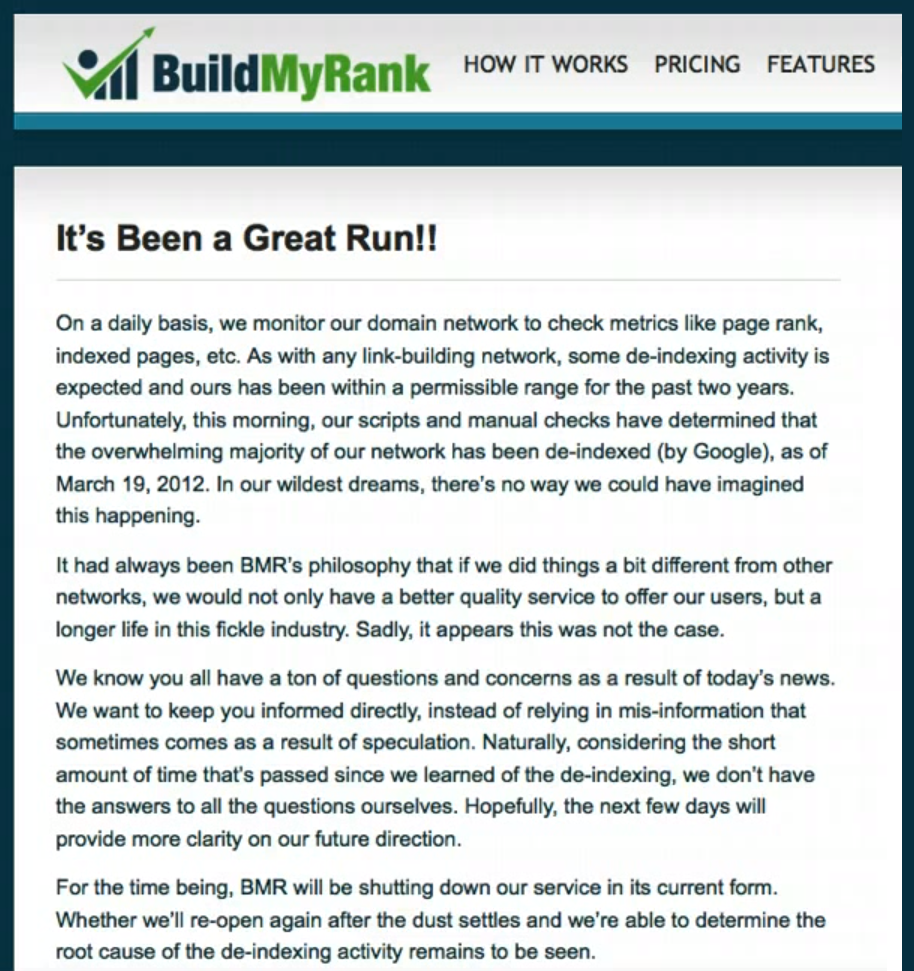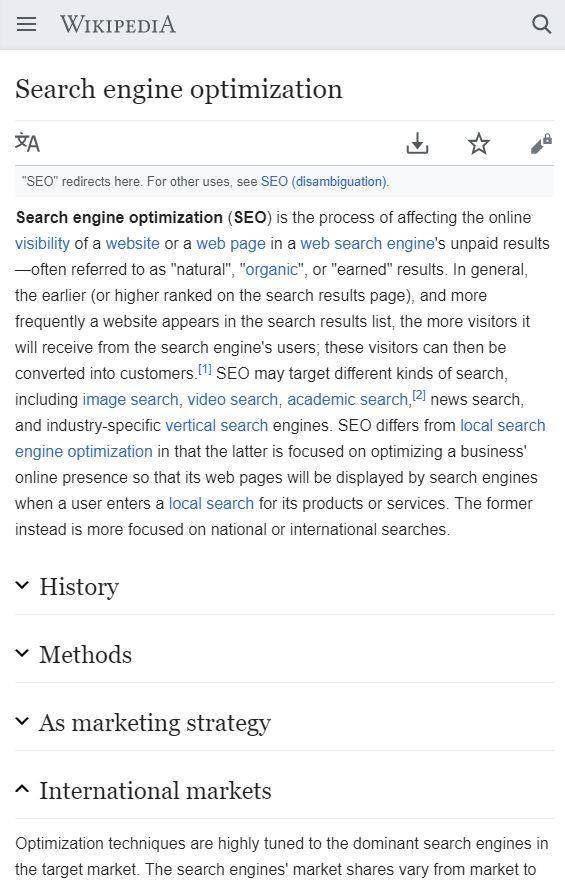We all know that BlackHat SEO is considered to be a bad thing. One might think: “as long as you can rank a website well with it, it must be good; there are risks of getting caught and penalized by Google’s algorithms, but most people take that risk, don’t they?”
Well… actually no. BlackHat SEO really is a bad thing. Not only for the one that uses it, but for you and everyone else, as well. Why? Because most BlackHat SEO tactics started off as legitimate ways to optimize your website. Tactics that, if properly used and not abused, might have still been safe and useful today.

- Guest Blogging
- Private Blog Networks (PBNs)
- Doorway Pages
- Buying/Selling Links
- Hidden Content in Tabs or Dropdowns
- Blog Comments (Spamming & Scamming)
- Confessions of a Google Spammer
Some people started noticing that specific tactics bring results (translated in higher traffic or ranks), and then others came and abused those tactics. Google then had to stop them. As manual review is virtually impossible, Google uses algorithms. When Google’s algorithms catch patterns that are against the guidelines, websites get penalized. Since the abuses actually come from legitimate techniques… I hope you see where this is going.
Long story short, some good-intended people are going to suffer from blackhat SEO (and I’m not talking only about people that hired unethical SEO agencies without knowledge). Here are some examples of how legitimate things got abused and are now hurting everyone, more or less.
1. Guest Blogging
Guest blogging started out long time ago as something nice. The magic of guest posting was that both sides would profit. The poster would benefit from access to the host’s traffic, exposure and probably a backlink, too. In return, the host would receive free, quality content.
However, as soon as people found out how beneficial these things could be for a website’s ranking, two things happened:
- It got abused: Some webmasters started scraping links and spamming people with guest post offers.
- It got charged: Some webmasters started charging people to host their guest posts.
Oftentimes, the price for hosting a guest post with links to a website would be a monthly fee. The link/guest post would be deleted if the guest poster failed to pay the fee. Everything turned upside down. In a normal Universe, the writer gets paid by the website owner. But in 2014’s SEO Universe, it was the other way around.
Matt Cutts wrote something about this back in the day, which is more or less the foundation of this article:
| Ultimately, this is why we can’t have nice things in the SEO space: a trend starts out as authentic. Then more and more people pile on until only the barest trace of legitimate behavior remains. We’ve reached the point in the downward spiral where people are hawking “guest post outsourcing” and writing articles about “how to automate guest blogging.” | |
 |
Matt Cutts |
| Former Head of Spam at Google / @mattcutts | |
What I think bothers Matt the most, is the fact that they’ve used “guest posting” as a term to cover up the spam that has been going on before with article directories. Article directories used to be great! They were today’s Medium. But then, they got clogged up with useless, spammy pieces of content.
Guest posting should be about you being invited to write somewhere, to share something unique with an audience. You can’t “outsource” guest posting, nor can you “automate” it. Outsourced, automated guest posting is basically article spam under another name.
But you know what the most dangerous part is? The fact that it works. Until you get penalized, of course. Rand Fishkin has the perfect explanation for this.
SEO is really hard and things move slowly. So, when you start with legitimate guest posts, it takes some time to see results. As soon as you do see results, you think the method is the Holy Grail. You want to find ways to keep doing it more and more. Thing is, it’s not so easy to convince someone to write on their website. Chances are even smaller to be invited to write.
So, instead, you expand by slowly optimizing the process of spamming people, outsourcing the content and paying webmasters to accept your posts. Congratulations! You’ve just turned something nice into a blackhat SEO technique.
In the end, not even real guest posts aren’t all that great. You know why? Because somebody else is actually benefiting from them.
| One of the frustrating things about guest posting that people forget all the time is that when you are putting content somewhere else, especially if that’s good content, especially if it’s stuff that’s really earning traffic and visibility, that means all the links are going to somebody else’s site. | |
 |
Rand Fishkin |
| The One True King of Moz / @randfish | |
Sure, some of that awareness and link equity is transferring onto you as well, and that’s why we do guest posting, but in the end, posting really good content on your own site is the best thing to do!
But the real problem with guest posts is that Google is taking measures against it. However, these measures affect everyone who has ever guest posted, because Google’s penalties are mostly based on algorithms. Some webmasters will get penalized for their legitimate guest posts as well and, then, others will miss great guest post opportunities out of penalty fear.
2. Private Blog Networks (PBNs)
After guest posting became cancerous, with one side spamming the hell out of the internet and the other side asking for recurring payment, blackhatters quickly came up with a brilliant idea.
“If nobody wants to accept guest posts without payment anymore, why not have your own websites on which you can send your own guest posts to?”
How did that go? Awfully wrong, of course.
Today we took action on a large guest blog network. A reminder about the spam risks of guest blogging: http://t.co/rc9O82fjfn
— Matt Cutts (@mattcutts) March 19, 2014
It didn’t take long for Google to find them. How, you ask? Well, it was actually quite simple. The services were public and anyone could buy them.
Matt probably put on a wig and pretended to be www.thebestdrillingmachineforsmallholes.com. He bought some links, tracked them down, penalized the entire network and, most importantly, fed everything to the algorithms.

BuildMyRank PBN shutting down after Google penalty.
These actions didn’t only affect the PBN owners. It affected everyone. The people that paid for the service got hit as well. Some of them were innocent, hiring agencies that used PBNs on their sites without their knowledge.
@n2tech when we take action on a spammy link network, it can include blogs hosting guest posts, sites benefiting from the links, etc.
— Matt Cutts (@mattcutts) March 20, 2014
But the funny part is that Google was always one step ahead. They laughed it off as if they had complete control, when in fact, they didn’t.
@danthies ah, glad you noticed that. Good to see at http://t.co/IizsTpta that it’s on peoples’ radar that they’re on our radar.
— Matt Cutts (@mattcutts) March 15, 2012
Soon after the PBN penalties, everybody started saying that PBNs are dead. The BlackHat Forums went crazy and many ‘make money online’ bloggers also agreed that PBNs don’t work anymore.
The difference is that those PBNs were actually only blog networks. They were never private, they were public. PBNs aren’t dead and they will never be. It’s very hard to catch a network of sites with completely different names, locations and webhosts, that doesn’t sell its services. But they are still vulnerable.
Most people that build Private Blog Networks will use expired domains, because they have higher authority. Google could be raising a red flag on those domains and monitor them more closely. Many people also used the disavow tool to feed all the PBN links they couldn’t remove. This helped Google learn even more patterns.
If a PBN does start from scratch, with fresh domains, then it’s even harder to detect, considering you covered it well. However, based on multiple patterns collected with the disavow tool throughout the years they can still be identified. One mistake, and you’re doomed.
Many people that have hired PBN based SEO agencies have expanded their business and made investments based on the revenue from the new traffic they have received. As soon as Google penalizes them, their revenue will drop, leaving them forced to kick people out of their companies and even on the verge of bankruptcy.
Also, consider that a private blog network costs about $2.500 to fully set up. We’re talking about small PBNs, with around 5-10 domains. You also have to spend a ton of time finding the domains and different webhosts, building the websites and good article writers. After that, you also have to manage the websites. If you fully outsource the creation, the costs can go up pretty high. All with the risk of getting penalized at some point.
The sad part is that this will, again, also affect innocent people. If you find a niche that seems to be working for you, what do you do? You expand. The same way Facebook bought WhatsApp and Instagram, the same way you will buy other websites or create new ones. It doesn’t mean it’s a blog network, but if you’re unaware of the problems and start linking between your sites, Google might see it as one and penalize it. If they fit a pattern, they will get penalized.
If you do have multiple sites, be careful on how you interlink between them, as it might trigger a penalty to your entire network of websites.
3. Doorway Pages
We’ve recently published a whole article dedicated to doorway pages just a while ago. I stated my frustrations with Google misleading people into thinking separate pages for multiple locations are a bad thing.
Whenever someone has a business that operates in different cities, SEOs jump to warn them about the risks of building doorway pages. The problem is that there are so many definitions for doorway pages, that people don’t know where to draw the line anymore.
Long story short, around 2004 people noticed that creating a page for each keyword variation can help you gain more exposure in search. So they found a method to scale it by duplicating pages and changing only the important keywords.
This way, Doorway Pages were created, or how Google puts it, “sites or pages that are created to rank highly for specific queries.” This is really funny, considering that most, if not all, of the pages on the web are created for that purpose.
There’s a growing search for a doorway pages alternative, but the truth is there is no alternative. There’s probably no such a thing as a doorway page either. If you have to create separate pages for separate keywords, that should be perfectly fine. But some people abuse this, creating irrelevant pages altogether and harming the community as well.
Webmasters are now confused and they sometimes get stuck, fearing not to get penalized. However, there are many examples of doorway pages ranking just fine.
4. Buying/Selling Links
Buying and selling links will always exist. In order to keep the top payers from the top positions in the organic searches, Google had to differentiate between the two, so they introduced the rel=”nofollow” attribute.
This attribute specifies to the Google bot that no equity should be passed from one site to another. In other terms, the link has no SEO benefit. It only sends the user through, if clicked.
But did people respect that? Of course not! They hate nofollow links. Nobody wants them, because they don’t help with rankings. Well, it turns out that nofollow links are actually not that bad, and that they can help with rankings.

Obviously, Google started penalizing those who pay for dofollow links. What happened in the end? Big publishers turned all their links into nofollow, to make sure that they don’t get penalized, as the link market within these publishers was thriving. Now a lot more people have to suffer.
Also, dofollow/nofollow links complicate everything a lot, as you can get penalized for a dofollow link that you obtained naturally, if it fits the pattern of some mass links buyer. If you’re interested, please read more about the dofollow / nofollow issue here.
5. Hidden Content in Tabs or Dropdowns
Yet another evergoing confusion… Ok, so obviously, hiding content with CSS or JS in order to manipulate search engines is a bad thing. But why would tabs and dropdowns be one? I mean, almost every menu out there is a dropdown. Should we not make them dropdowns anymore?
Well, back in the day, webmasters were hiding massive amounts of keyword rich content in the favor of ads or copy. This meant that if Google indexed that content the same way, it could show up in the meta description, misleading the users into thinking they would find that information on the page. Had it been a clear and obvious tab or dropdown, however, I’m sure that people would have had no problem finding it.
Google has to justify their action in some way because, obviously, people are confused. We all know the reason for this was abuse, but why can’t I put content in a tab to make my site look better, just because some guy uses white font on white background to stuff in keywords and keep his site pretty?
Although John Mueller spreads fear that tabs and dropdowns will affect you, Matt Cutts (former Head of Spam @ Google) has a way better explanation for this:
Obviously, if you don’t really hide your content, there’s nothing to fear. Just make your dropdown arrows and tab switches visible and not a 1×1 pixels wide dot. You can also hear him say:
If you use a common framework to do your dropdowns, that a lot of other websites use, then there’s less likelihood that we might accidentally classify it as hidden text.
This means that Google does indeed make mistakes and because of blackhat practitioners, well-intended SEOs will suffer as well.
But now, apparently, it’s ok to use hidden content again, as of 2016 and the mobile first index.
no, in the mobile-first world content hidden for ux should have full weight
— Gary “鯨理” Illyes (@methode) November 5, 2016
However, let me tell you one thing. It was always OK to use content hidden in tabs or dropdowns, just as Matt Cutts mentioned in the video above. However, if it was really hard or impossible for the user to view it, it would not get indexed and could potentially get your site penalized.
For many years, people have thought that content in tabs and dropdowns was a bad thing, so they didn’t use it. Except for Wikipedia. Wikipedia has been using it for quite a while, dominating the top positions on almost every keyword.

6. Blog Comments (Spamming & Scamming)
I’ll be blunt. I hate spam. I work with a lot of websites, and often, I see something like this:

Website being spammed with comments
This resulted in the server trying to send 12000 notifications through e-mail, which was POP3 synced with a Gmail account. Google eventually banned the website’s IP address for spam, when in fact, it was not this website that was doing the spam. Yey BlackHat!
In the end, nobody wins from this, as none of those comments are approved, so they don’t show up on the page.
Spamming doesn’t work anymore, but a lot of people still do it. I tested tools like GSA and ScrapeBox. They don’t work for building high quality links. Most quality sites don’t auto-approve comments. It will be just a waste of your money and time, as these software have a pretty steep learning curve.
ScrapeBox, however, can be pretty useful for identifying quality sites, as its main purpose is to scrape Google for links. You can use it to create a database of potential websites you can pitch your content to.
And don’t get me wrong. Blog commenting isn’t BlackHat and is actually a pretty useful technique. However, the point should be to really try and establish a relationship through your comments with either the blogger, the readers or the other commenters.
These days, people think that blog commenting is a bad thing, when actually, it isn’t. To be more specific, it never was!
Commenting is the life force of blogging.
It’s the way people used to establish connections and it still is. Spam and irrelevant stuff written just to get a backlink, be it automated or manually built, is never a good thing.
7. Confessions of a Google Spammer
So far, we’ve talked about how spam hurts the internet, its users and ethical webmasters, but I want to end this by sharing something for the BlackHat SEOs out there. It’s an old story, told by a Google Web Spammer.
He used to do blackhat SEO which would constantly blast other sites with spam to rank his own sites or his clients. He spammed the internet so much that he ended up making over $100k per month. This is an insane amount of money, which permitted him to buy expensive houses and cars, hire a cook and spend time with his son whenever he wanted.
However, it was when Google kicked in with the penalties that his troubles began. At first, he thought that he would just rinse and repeat, as usual, but in a couple of months it was clear that it wasn’t going to work this time. He wasted a lot of money trying new methods, in vain. Most of his spammer friends were in the same situations, many of them turning to drugs to get relief from the stress.
This guy knew the risks, despite the fact that he believed himself to be invincible for a while. However, most businesses don’t know the risks at all. Many SEO freelancers and agencies lie to people by promising them high rankings in record time. Traffic and profits go up and the companies start investing, then BOOM! Suddenly it’s all over.
You can read more about the Confessions of a Google Spammer here. The story has a good ending.
Conclusion
I understand why people do BlackHat SEO. I understand that it’s about money. I understand their frustration about not putting the work to become the world’s largest search engine and have everyone obey by their rules and then complaining about it (ironic).
But what ignites my hatred towards it is the fact that it’s also usually related to horrible services, spam, scams, viruses & malware and even worse. No scammer will ever use whitehat SEO, because they know there’s no need for long time investment. They care so much about Google’s evil monopolized reign, but they don’t give a damn about the kids they scam with fake Candy Crush cheats offers.
Acquaintance: “Hey, what do you do for a living?”
BlackHat SEO: “I scam kids online.”
Elon Musk has success with Tesla, although the electric car is a concept dating back 100 years. Why? Most likely because he made his electric car better than a petrol one. Nobody achieved that before. On the same line, blackhat techniques were more efficient than whitehat ones for a very long time. However, things are starting to change for the better, thanks to Google and the whitehat SEO community’s efforts.
Next time you see some blackhat stuff going on, please don’t just overlook it because you’re not the one doing it. Openly disagree with it, complain about it and report it to Google. It’s going to make the internet a better place for everyone.
The post 7 Examples of How BlackHat SEOs Hurt You, The Internet & Everyone Else appeared first on SEO Blog | cognitiveSEO Blog on SEO Tactics & Strategies.
Via Marketing http://www.rssmix.com/
No comments:
Post a Comment